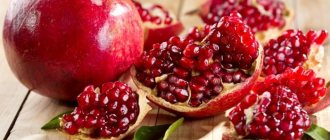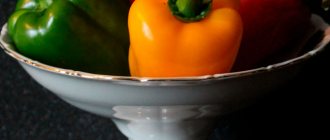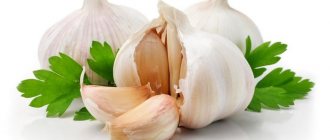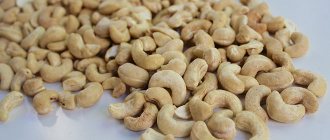1
Prepared by: Elena Alex
06/08/2016 Cooking time: 45 min
| Save | I cooked) | Estimate |
Many women at one time have a question, how and from what to cook compote for a nursing mother? I would like to offer you one of the options for preparing such a tasty and healthy drink.
Is there any benefit from dried fruit compote?
Fruit mixtures from any fruit in the first weeks of a baby’s life can cause colic and digestive problems. Pediatricians urge nursing women to consume dried fruit compote with caution. And it is advisable to soak the fruit for 2 to 3 hours before cooking.
Nutritionists say that compote made from dried fruits is much healthier than a drink made from fresh fruits. Dried fruits not only saturate the baby’s body with all the necessary microelements, but also help a woman recover quickly after childbirth. In addition, doctors note that dry fruits improve lactation.
Dried prunes and dried apricots in combination with other fruits will be beneficial for gw. Nutritious, pleasantly tasting dried fruit compotes with berries during breastfeeding will give mommy energy and improve the baby’s digestion.
Beneficial properties of drinks made from dried fruits:
- Increases breast milk production;
- Boost immunity;
- Improve digestion and help get rid of constipation;
- Supplement the diet of a nursing mother.
Possible harm of prunes during lactation, when and why should a nursing mother not eat prunes?
Despite the fact that the product has such a large list of beneficial properties, there are some contraindications and side effects. Since prunes have a laxative effect, they can cause diarrhea. People with diarrhea should not eat the treat. If your baby often has loose stools when you eat prunes, you should understand that this can cause dehydration. In addition, there is a risk of individual intolerance, when the use of the product is strictly prohibited.
Contraindications include:
- diabetes;
- liver diseases;
- acute stomach diseases;
- sick pancreas, etc.
Prunes are not on the list of allergens, so it is useful to eat them while breastfeeding. Despite this, there is always a minimal risk of allergies. Therefore, after consuming the product, the mother should carefully monitor the baby’s reaction. The presence of rashes, itching, tearing, etc. are symptoms of allergies. If you see such a reaction, stop eating prunes immediately. If symptoms are acute, you should consult a doctor immediately.
The nuances of drinking the drink
You can find reviews on the Internet in which mothers have a positive attitude towards consuming compote from a mixture of dried fruits. Many women noted that the broth tastes good and can be safely consumed even during breastfeeding, but it is important to take into account several nuances.
Any dried fruit is a potential allergen for a baby’s fragile body. Therefore, they should be introduced into the diet of a nursing woman gradually and with extreme caution. The newborn digestive system is unknown how it may react to a new product. Introducing dried fruit compote in small quantities into your diet will be the right decision. If a mother with breastfeeding suffers from an allergic reaction to any fresh fruit, she should not drink it in a decoction.
With normal tolerance to dried fruits, a nursing mother can prepare a tasty and healthy compote from the following fruits:
- Dried apricots (dried apricot) - has a powerful restorative effect and has a beneficial effect on the endocrine system;
- Raisins (dried grapes) – strengthens the nervous system, normalizes blood pressure;
- Date (fruit of the date palm) – protects teeth from caries, strengthens the immune system;
- Rosehip (fruit of a bush rose) – has a bactericidal effect, normalizes the functioning of the cardiovascular system and normalizes digestion;
- Prunes (dried plums) - tones, improves the general condition of the body and eliminates constipation.
Breastfeeding women should start consuming decoctions of the dried berries listed above gradually, maintaining an interval. All time restrictions are necessary in order to understand whether the compote is suitable for the baby or not.
So, for example, infusions from dried plum berries can be introduced into the diet only three weeks after the baby is born, and from rose hips and dried apricots - only after a month. If any kind of anxiety appears in the baby and the tummy is bloated, it is better to avoid such compote for several months. In general, the liquid drink has a pleasant sweetish taste and is well tolerated by newborns. The decoction of dried fruits is taken warm, 10-15 minutes before the main meal.
Types of liver
Beef liver
Liver during breastfeeding is an excellent alternative to beef. It has lower calorie content and better ease of absorption. The offal is rich in protein and iron.
This is what is recommended to be used during diets. This is due to the fact that proteins here are perfectly correlated with fats: for 18 grams of protein there are only 3-4 grams of fat.
Beef by-products are extremely high in selenium, and thanks to its antioxidant properties, it helps prevent cancer and heart and vascular diseases. Doctors advise using this product for anemia. A young nursing woman, having eaten only 100 grams of liver, will charge her body with vitamins for a day.
The liver can be boiled and added to salads, the recipes for which are numerous. Boiled by-product is also widely used for making pates, rolls and casseroles. The most delicious cooking method is stewing. The classic version with sour cream can be supplemented with other ingredients: prunes, apples, herbs, and oranges (see also: can a nursing mother eat prunes in the first month of breastfeeding?)
True, the latter require caution in use during breastfeeding
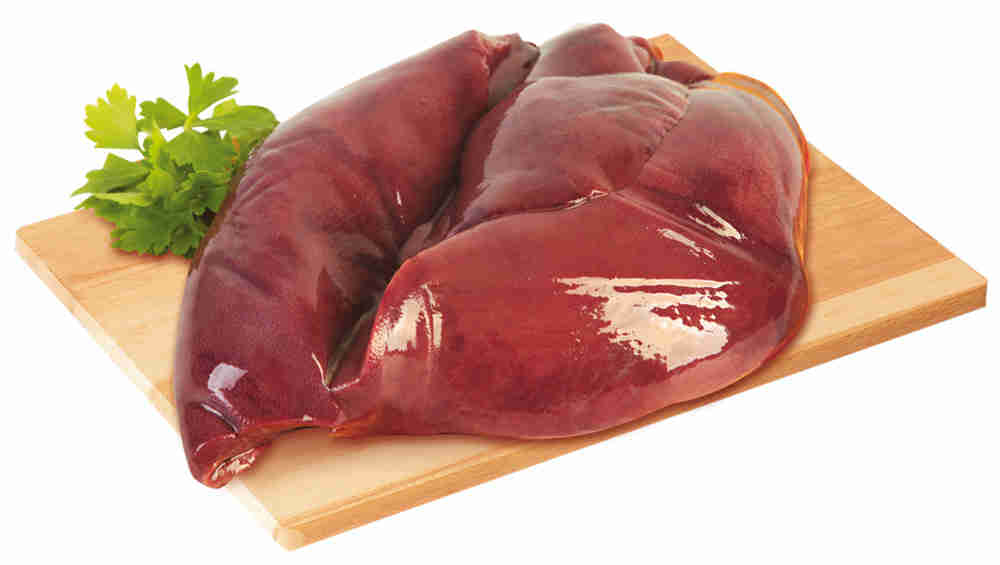
You can get rid of the bitterness of the offal by first soaking it in cold water or milk. Soaking time: minimum 30 minutes. Cooking for too long can make the product tough, so be aware of the cooking time:
- whole – about 40 minutes;
- in small pieces - no more than 5-10 minutes.
The offal contains a lot of cholesterol, which can cause diseases of the cardiovascular system. In this regard, it is not recommended to eat beef liver for those who have high blood cholesterol levels.
Chicken and turkey liver
The liver of these species cooks even faster, and it is almost impossible to spoil it. Its fat content is higher compared to beef, pork or lamb. Goose and duck liver are not suitable for consumption during lactation, as they are excessively fatty.
Chicken liver will be an excellent source of folic acid, the percentage of which doctors advise increasing in the first trimester of pregnancy. Its deficiency in the body can provoke the appearance of neural tube defects in a child. Folic acid will also be useful for nursing mothers. Choline present here helps brain function and stimulates memory.
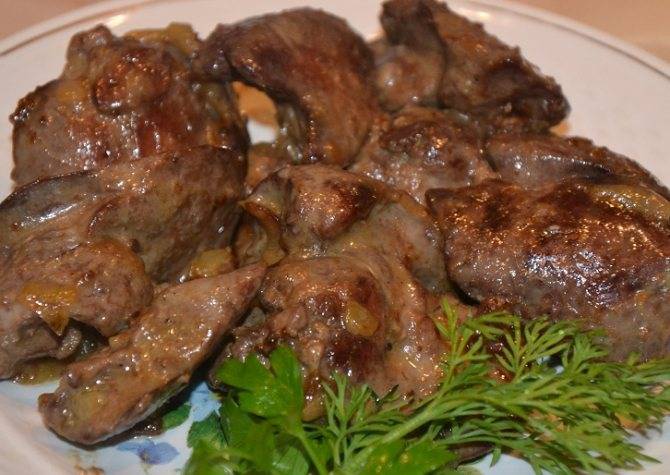
Choosing the right chicken liver involves following a number of simple rules:
- The fresh product can be stored for no more than 2 days;
- Brown color;
- surface – shiny and smooth;
- absence of blood clots;
- no unpleasant odor.
Ideally, for cooking, it is better to take a chilled version rather than a frozen one. You can make a wonderful fluffy pate from chicken liver. Also good is the method of cooking in a pot, baked in the oven, where the offal will go perfectly with cereals, vegetables or potatoes. A traditional dish is buckwheat with liver.
READ ALSO: Can a nursing mother eat potatoes?
From fish
A growing body will be extremely grateful for a treat with cod liver, because it is very healthy. The main thing is not to forget that it is high in calories. There are 630-650 kcal per 100 g of product, which means you shouldn’t overuse cod liver during the postpartum period, otherwise you can gain a couple of extra pounds, which every woman dreams of losing anyway (see also: can a nursing mother eat oatmeal or other cookies? ). Excessive fat content of the offal will make it difficult for the baby to consume cod liver, especially in the 1st trimester of life, because the activity of the gastrointestinal tract is still developing.
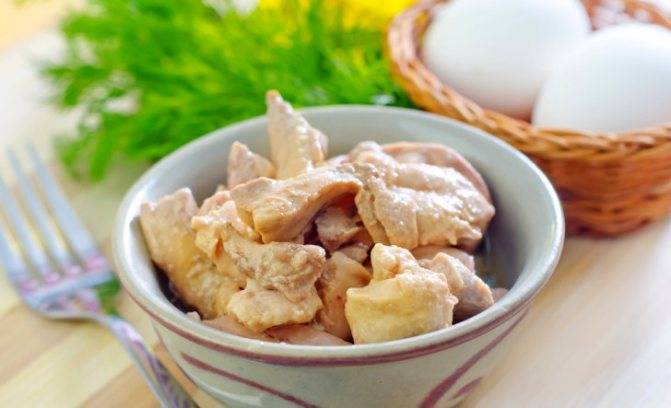
Pork
Pork liver is the most popular in society. It is very soft, easy to prepare, and also has a number of taste features that many people like. There are a lot of vitamins and macroelements here, which means everyone will benefit from the product. Is a nursing woman also one of the eaters? Will pork liver harm the baby if the mother eats it in large quantities?
Doctors recommend excluding this offal from the diet of a nursing mother for at least 3-4 months. This ban is connected by the fact that this product contains the highest amount of cholesterol. Excessive fat content can cause various intestinal disorders: gas formation and colic.
Mothers suffering from diseases of the liver, pancreas and bile ducts should choose something else. Pork offal is not suitable for consumption in this case.
When your body has too much potassium and vitamin D, you should eat cod and pork liver with great caution.
READ ALSO: Is it possible to eat pork while breastfeeding?
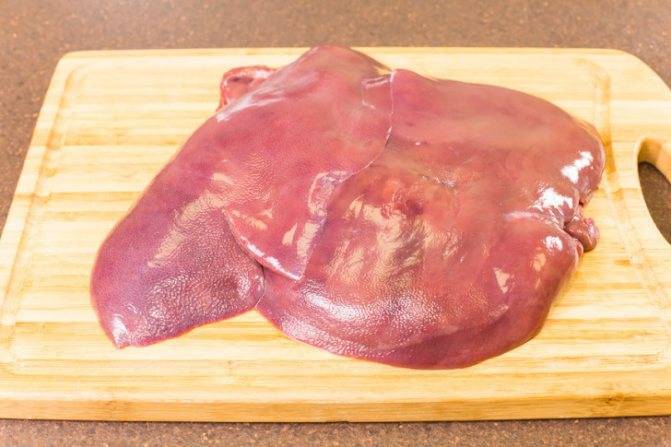
When not to drink compote
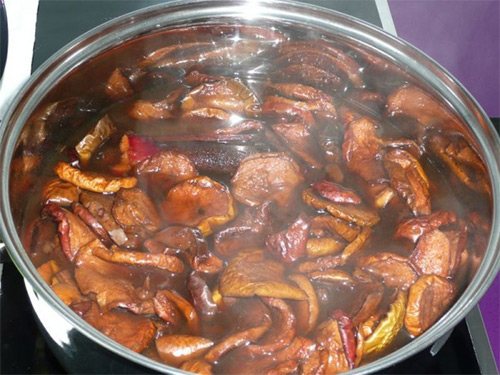
Is it possible or not for a nursing woman to drink dried fruit compotes? Women who are breastfeeding should not introduce such a drink into their diet immediately after delivery and for 3-4 weeks after the birth of the child. All this is associated with the risk of colic in babies during this period. In addition, fruit mixtures contribute to the upset of the baby’s tummy.
Before consuming compote, a breastfeeding mother should:
- make sure there is no allergic reaction to fresh fruit;
- try the dried fruit itself in a small amount (if there is no allergy).
If you have allergic rashes on the skin of a newborn, you should also refrain from taking a drink made from dried fruits.
The most popular dried fruits
Dates have long been known to nursing mothers as an excellent milk extractor. Their consumption stimulates the production of oxytocin in the human body, and this hormone is extremely important for quality lactation. Dates are rich in potassium, magnesium, as well as some important amino acids that promote the production of serotonin - the “happiness hormone”. By consuming these dried fruits regularly, you can quickly cope with bad mood, fatigue, depression, while simultaneously strengthening your immune system, improving your memory and defeating insomnia.
Raisins or dried grapes are a real storehouse of vitamins and microelements, including phosphorus, potassium, and nicotinic acid. Eating raisins helps normalize metabolic processes in the body, stimulates the brain and nervous system, improves sleep quality and increases the body's resistance to various diseases. In addition, dried grapes can be an excellent substitute for antidepressants, as they can effectively combat depression, loss of strength and other manifestations of postpartum depression.
Prunes are rich in fiber, iron and potassium. With its help, many women easily and quickly solve problems with postpartum constipation. Moderate consumption of prunes during breastfeeding also helps normalize stool in infants. In addition, dried plums will be useful for mothers with weakened immune systems, suffering from chronic fatigue and unstable blood pressure. (you can also read about prunes for nursing mothers here)
Dried apricot fruits, called dried apricots, contain large quantities of magnesium, potassium and other important trace elements and vitamins. Thanks to this composition, dried apricots have a beneficial effect on the nervous system of a nursing woman, helps restore strength after childbirth, has a positive effect on kidney function, helping to reduce swelling, and is also a mild laxative. In addition, dried apricots have a pleasant sweetish taste, which means they can replace harmful and high-calorie sweets and cakes. (you can also read about dried apricots for nursing mothers here)
How to use it correctly
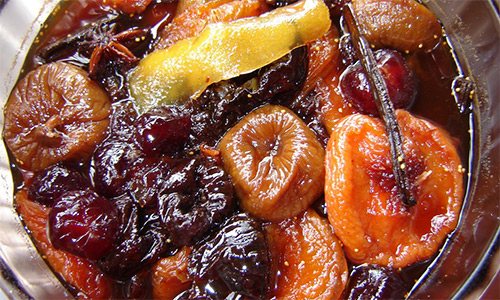
To prevent a breastfeeding baby from having digestive problems after dried fruit compote drunk by a nursing mother, it is important to adhere to the following restrictions:
- Drink only a freshly prepared drink from dried fruits, the total dosage per day is 200 ml.
- Consume every other day.
- The total volume per week is no more than 4 glasses.
It is necessary to begin introducing any new dish, including dried fruit compote, into the diet of a nursing mother gradually. A drink of no more than 40 ml is taken in the morning or at lunchtime. You should not drink compote in the evening or before bed. Pay attention to the condition of the baby’s skin, as well as his well-being.
If the child’s tummy accepts the compote normally and no rash appears on the body, then at the next dose the volume can be increased to 100 ml.
Is it possible to eat dried apricots while breastfeeding?
Scientists at the Institute of Nutrition and most doctors agree that dried apricots, as well as prunes, can and should be consumed during lactation. Healthy and tasty dried fruits should be included in the daily menu even during pregnancy. Prunes are useful for a nursing mother because:
- due to the high content of pectin, dried apricots do an excellent job of removing harmful radionuclides and heavy metal salts from the body, and this is very important, since all harmful substances can be transmitted through mother’s milk to the baby;
- due to the high concentration of vitamins, it helps to avoid vitamin deficiency in the autumn-winter period;
- Natural sweet substances glucose and fructose can completely satisfy a nursing mother’s need for sweets. Dried apricots and prunes will not provoke an increase in blood sugar levels and will not spoil your figure with extra pounds;
- excellent prevention of constipation and a natural product to combat it;
- normalizes blood pressure;
- due to the high iron content of dried apricots, it is an excellent prevention of anemia, helps the body recover from blood loss during childbirth;
- improves memory, concentration;
- dried apricots have a diuretic effect, therefore, it is useful for women suffering from edema and for normalizing kidney function.
Delicious recipes
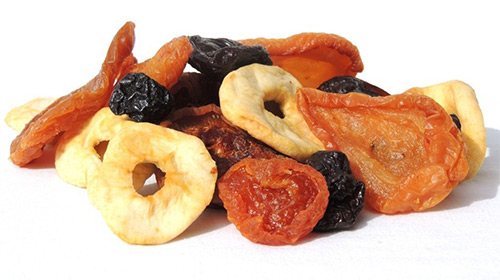
A drink made from a dry fruit mixture for a nursing mother cannot be purchased in a store. A compote is made from fruits that have been washed several times. You should not add special mixtures other than vanilla or granulated sugar.
Often a drink made from dry fruits is called uzvar, but in fact these are different drinks. Unlike uzvar, dried fruit compote is cooked until the fruits are completely cooked. And in the first version, the berries are brought to a boil, after which they are allowed to brew.
It is better not to add spices to the compote:
- cloves;
- cinnamon;
- allspice;
- citric acid.
Spices can change the taste of breast milk and the baby will refuse the breast.
Recipe No. 1
Breastfeeding mothers are most worried that their diet does not contribute to the development of allergies in the baby. Therefore, the first dried fruit compote should be mono-component, that is, consist of only one fruit. After tracking the child’s reaction, you can add the next ingredient.
We will need:
- 2 liters of purified water;
- 200 grams of dried apples;
- 2 tablespoons of granulated sugar.
Apples must be thoroughly rinsed with tap water to remove dust, sand and other contaminants. Then they are poured with boiling water and allowed to stand for ten minutes, this will destroy all pathogenic bacteria. The water is drained. The apples are transferred to a saucepan and filled with cold water. The mixture is brought to a boil. Then cover the compote with a lid, reduce the heat to low and let it simmer for 25 minutes. Cool and strain through cheesecloth or a sieve.
Sugar is added at the very end. Put one spoon first, perhaps the sweetness will be enough. If not, add more. However, we still advise you not to abuse sugar. The compote can be served either hot or chilled.
Recipe No. 2 in a slow cooker
Mothers who breastfeed their babies always lack time. Standing over a saucepan when there is still a lot to do in the house is not an option. In this case, a multicooker will come to the rescue. The device will do the job perfectly, freeing up time to communicate with the newborn.
We will need:
- water, its quantity depends on the volume of the multicooker bowl;
- a mixture of dried fruits, also depends on the previous parameter;
- sugar.
Fruits should also be washed and poured with boiling water for 15 minutes. If desired, they can be soaked in clean water for several hours or overnight. Then transfer them to the slow cooker, set the “stew” mode for 40 minutes. Sugar is also added at the very end.
Recipe No. 3
You can prepare another compote from dried fruits. You will need: 3 tbsp. spoons of dried apricots, rose hips, prunes, dried apples. Dried fruits are washed, foreign impurities are removed and soaked in water for 45 minutes. Place the prepared raw materials in a saucepan with water (2 liters) and cook over moderate heat for 30 minutes. The drink tastes pleasant and sweetish, so you don’t have to add granulated sugar.






